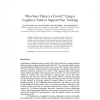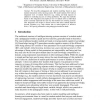64 search results - page 1 / 13 » Modeling self-efficacy in intelligent tutoring systems: An i... |
UMUAI
2008
13 years 4 months ago
2008
Abstract. Self-efficacy is an individual's belief about her ability to perform well in a given situation. Because selfefficacious students are effective learners, endowing int...
AIED
2007
Springer
13 years 11 months ago
2007
Springer
Adding student collaboration to an intelligent tutoring system could leverage the benefits of both approaches. We have incorporated a mutual peer tutoring script, where students of...
AIED
2009
Springer
13 years 11 months ago
2009
Springer
Affect has been the subject of increasing attention in cognitive accounts of learning. Many intelligent tutoring systems now seek to adapt pedagogy to student affective and motivat...
WSC
1997
13 years 6 months ago
1997
SimTutor is a multimedia intelligent tutoring system (ITS) for simulation modeling. Multimedia systems are now de facto standard on personal computers and increasing number of int...
EDM
2010
13 years 6 months ago
2010
We describe pedagogical and student modeling based on past student interactions with a tutoring system. We model student effort with an integrated view of student behaviors (e.g. t...


